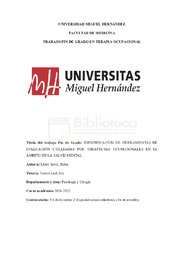Abstract:
La evaluación es tanto la primera toma de contacto con los usuarios, como una de las
partes más importantes del proceso de la terapia ocupacional cuyo fin es la correcta y
más adecuada forma de plantear todo el proceso de intervención. El objetivo de esta
investigación es la identificación de las herramientas de evaluación más utilizadas por
los terapeutas ocupacionales en el ámbito de la salud mental, así como conocer qué
áreas o aspectos a evaluar no se dispone de herramientas y/o escalas de evaluación
específicas para este ámbito.
Se realizó una encuesta ad hoc online de 8 preguntas al que se le dio difusión para
conseguir el mayor número posible de terapeutas ocupacionales que trabajan en el
ámbito de la salud mental en el territorio español.
Participaron 103 personas de 16 comunidades autónomas distintas, principalmente de
Madrid y la Comunidad Valenciana, pertenecientes a distintos recursos y centros, con
mayor porcentaje de profesionales en Hospitales. Los resultados muestran que las
herramientas más usadas por los profesionales son el Listado de Intereses, el Listado
de Roles, la escala de Lawton y Brody, la OPHI-II y el Cuestionario de Ocio.
Además, expresaron la necesidad de creación de herramientas para evaluar diferentes
aspectos como la sexualidad, la relación familiar y social, la historia vital y roles
desempeñados en ella, percepción de su propia salud mental y expectativas de su propia
recuperación, funcionamiento ocupacional de personas con ideas suicidas, entre otras.
En cuanto a los motivos para no usar determinadas herramientas de evaluación
alrededor del 30% de los encuestados consideran que no pueden localizar las pruebas
estandarizadas que necesitan.
Los resultados de este estudio permiten concluir que se han cumplido tanto el objetivo
principal como el secundario. Se han identificado las herramientas de evaluación más
utilizadas por los terapeutas ocupacionales en salud mental, así como las necesidades
específicas en cuanto a herramientas y escalas de evaluación.
Evaluation is both the first point of contact with users and one of the most important
parts of the occupational therapy process, as it determines the correct and most
appropriate way to approach the entire intervention process. The aim of this research is
to identify the most commonly used assessment tools among occupational therapists in
the field of mental health, as well as to determine which areas or aspects lack specific
tools and/or scales for this context.
An ad hoc online survey consisting of 8 questions was disseminated to reach as many
occupational therapists working in the field of mental health in Spain as possible. A
total of 103 individuals from 16 different autonomous communities participated,
primarily from Madrid and the Valencian Community, representing various resources
and centers, with the highest percentage of professionals working in hospitals.
The results show that the tools most frequently used by professionals are the Interest
Checklist, the Role Checklist, the Lawton and Brody Scale, the OPHI-II, and the
Leisure Questionnaire. Additionally, participants expressed the need to create tools to
evaluate various aspects such as sexuality, family and social relationships, life history
and the roles performed within it, self-perception of mental health and recovery
expectations, occupational functioning of individuals with suicidal ideation, among
others. Regarding reasons for not using certain assessment tools, approximately 30% of
respondents stated that they cannot locate the standardized tests they need.
The results of this study allow us to conclude that both the main objective and the
secondary objective have been achieved. The most commonly used assessment tools
among occupational therapists in mental health have been identified, as well as specific
needs regarding tools and evaluation scales.
|

.png)
